Ethnographic Methods ANTH 380 Instructor: Dr. Angela N
advertisement
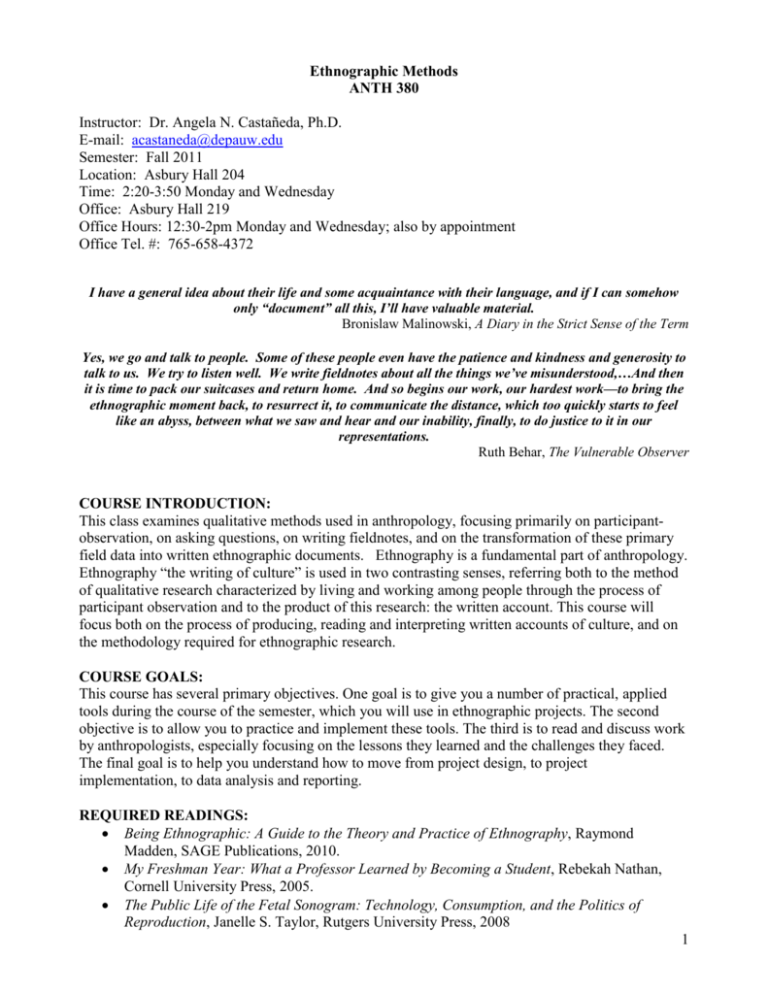
Ethnographic Methods ANTH 380 Instructor: Dr. Angela N. Castañeda, Ph.D. E-mail: acastaneda@depauw.edu Semester: Fall 2011 Location: Asbury Hall 204 Time: 2:20-3:50 Monday and Wednesday Office: Asbury Hall 219 Office Hours: 12:30-2pm Monday and Wednesday; also by appointment Office Tel. #: 765-658-4372 I have a general idea about their life and some acquaintance with their language, and if I can somehow only “document” all this, I’ll have valuable material. Bronislaw Malinowski, A Diary in the Strict Sense of the Term Yes, we go and talk to people. Some of these people even have the patience and kindness and generosity to talk to us. We try to listen well. We write fieldnotes about all the things we’ve misunderstood,…And then it is time to pack our suitcases and return home. And so begins our work, our hardest work—to bring the ethnographic moment back, to resurrect it, to communicate the distance, which too quickly starts to feel like an abyss, between what we saw and hear and our inability, finally, to do justice to it in our representations. Ruth Behar, The Vulnerable Observer COURSE INTRODUCTION: This class examines qualitative methods used in anthropology, focusing primarily on participantobservation, on asking questions, on writing fieldnotes, and on the transformation of these primary field data into written ethnographic documents. Ethnography is a fundamental part of anthropology. Ethnography “the writing of culture” is used in two contrasting senses, referring both to the method of qualitative research characterized by living and working among people through the process of participant observation and to the product of this research: the written account. This course will focus both on the process of producing, reading and interpreting written accounts of culture, and on the methodology required for ethnographic research. COURSE GOALS: This course has several primary objectives. One goal is to give you a number of practical, applied tools during the course of the semester, which you will use in ethnographic projects. The second objective is to allow you to practice and implement these tools. The third is to read and discuss work by anthropologists, especially focusing on the lessons they learned and the challenges they faced. The final goal is to help you understand how to move from project design, to project implementation, to data analysis and reporting. REQUIRED READINGS: Being Ethnographic: A Guide to the Theory and Practice of Ethnography, Raymond Madden, SAGE Publications, 2010. My Freshman Year: What a Professor Learned by Becoming a Student, Rebekah Nathan, Cornell University Press, 2005. The Public Life of the Fetal Sonogram: Technology, Consumption, and the Politics of Reproduction, Janelle S. Taylor, Rutgers University Press, 2008 1 Righteous Dopefiend, Philippe Bourgois and Jeff Schonberg, University of California Press, 2009 Translated Woman (2nd ed), Ruth Behar, Beacon Press, 2003 ASSIGNMENTS: 1. Pilot Field Study (40%) a. For this study, you are to select a site and design a mini-research proposal by week 3. Throughout the semester you will do assignments at your chosen field site that are designed to give you practice using specific methods for data collection (4 assignments worth 10% each). During the second half of the semester, students will dedicate one day a week to fieldwork and turn in typed fieldnotes on a bi-weekly basis. Students will also be organized in small teams who will read each other’s fieldnotes, share practical problems and solutions. 2. Research Report (30%) a. The course will culminate in a final ten-page research report on the trial field project. It should include: 1. A problem statement, supported by some references to the research literature. 2. A description of the research site, including people and activities involved. 3. A description of your method for gaining access to the site and establishing field relationships. Observer effects on the data. Ethical problems encountered. 4. A description of your data-gathering activities. 5. A description of your data-analysis procedures. 6. A statement of your findings. These will be exploratory and tentative, but should be grounded in the data you will have collected. How do the findings relate to your original problem statement? Do they confirm, refute, or suggest a reformulation of the research problem? What do these early findings suggest about what you would need to do to continue this research? b. Each student will present their research findings to the class. Classmates are expected to offer feedback on the research methods and findings. 3. Thoughtful Participation (10%) a. Remember, this is a seminar-style course and a portion of your grade is based on your participation. This includes active listening, responding to your classmates in respectful and engaging ways; also making comments that connect with course readings and demonstrate that you have read and thought about the material for the day’s discussion. Each student will be expected to lead the discussion with a partner for one class, either as advocate or critic of the assigned readings. While there are assigned discussion leaders, you should be prepared to fulfill this role on any given day—this requires that you come to class having finished the reading and thought about possible questions and comments to share with the class. You should reflect on the key methodological questions you see in the readings, issues you think are worthy of further discussion, and analytic problems you think are important in the readings. 4. Critical Reaction Paper (20%) a. Submit a six-page critical reaction paper comparing, contrasting, and evaluating two of the required course ethnographies, connecting key themes and concepts discussed in class. 2 Your final grade for the course will be based on the following: Pilot Field Study.……..…….……………40% Research Report…....…………………….30% Participation..…..………………………...10% Paper..…………………………………....20% TOTAL 100% GRADING SCALE: A 94%+ A- 90-93% B+ 87-89% B 84-86% B- 80-83% C+ 77-79% C 74-76% C- 70-73% D+ 67-69% D 64-66% D- 60-63% F 59%A note on graded materials—you must wait at least 24 hours (but no more than 1 week) before coming to see me about a grade you received on any class material. I am available for consultation regarding any graded assignment only after you have taken sufficient time to read through both your original work and my comments. Keep in mind that reviewing graded material means a possible increase OR decrease in the original grade, so be sure to look over your work carefully before bringing it to my attention for a second time. The following information will help you better understand the criteria for graded material: A= exceptionally thought-provoking, original, creative in both content and manner of presentation, and a skillful use of concepts and/or materials which are fully supported. B= presents a solid understanding of the subject matter and an ability to handle the issues and materials encountered in the subject with only minor errors. C= demonstrates an adequate understanding of the subject matter with central ideas present, but too general, repetitious and not clearly supported or integrated with evidence and details. D= a minimally acceptable performance with a confusing central idea and lacking details. Parts of the assignment are missing and/or incomplete. F= shows lack of effort and minimal comprehension of material with major mechanical errors, no thesis, and misuse of key concepts. Attendance: Regular attendance and active class participation is required. Late arrivals will not be tolerated. Class attendance will be taken at the beginning of the period, and it is your responsibility to make sure you receive credit for your attendance if you arrive after attendance is taken. Irregular attendance and repeated late arrivals will result in the lowering of the final course grade. Class Preparation: Your class preparation is essential to your required active participation in the course. You must complete assigned readings before the class period for which they are assigned. You must come to class with prepared questions and comments regarding the assigned readings (see participation in course requirements). This will help ensure your active participation in class. 3 Things to think about regarding the readings: What was the author’s main point/thesis? How does this relate to the class topic? What connection can you make between the reading and your own life? Assignment Policy: It is important that students pay close attention to the details on assignments, which will be provided in handouts. Hard copy assignments must be turned in NUMBERED AND STAPLED (electronic copies must also have page numbers—also it is the students responsibility to make sure their assignment is properly attached to the email). All assignments are due at the beginning of the class session, unless otherwise noted. Late assignments will not be accepted without a medical excuse or otherwise documented emergency. The instructor retains the right to lower the grade on any late assignment accepted. If you must miss class on the day an assignment is due, it is your responsibility to turn the assignment in early. Academic Dishonesty: All work must be your own. You must give credit to any information and/or ideas that you use that are not your own by citing it in your work. Failing to do so will be perceived as plagiarism resulting in a zero on the assignment and possible additional penalties to be decided by the instructor. If you are unfamiliar with proper citation procedures, you should consult the W center and/or Diana Hacker’s A Pocket Style Manual. Questions??? I encourage all of my students to take advantage of my office hours, either for questions, concerns, or just “drop-in” discussions. Please feel free to stop by Asbury Hall 219, and if the “official” hours are not convenient or you would like to ensure yourself a specific block of time, we can set up an appointment (office phone x4372 or email acastaneda@depauw.edu). COURSE SCHEDULE WEEK 1: The Why and What of Ethnography August 24th Course introductions and expectations. HOMEWORK ASSIGNMENT: Post a 2 page autobiography. If possible, use anthropological concepts you are familiar with to describe your identity, community of origin, and culture (due by Saturday at 5pm). Read the descriptions of your classmates before our second meeting. WEEK 2: Ethnography and Ethics—the ethical responsibilities of ethnographers and the process of informed consent. August 29th READ: Madden Intro and ch. 1 August 31st READ: Madden ch. 2; Nathan chapters 1-4 DISCUSSION LEADERS HOMEWORK ASSIGNMENT: This will be the first step toward your major research project. Go out, explore the world, and come back with some possibilities for the research topic, setting, scene, locale, etc. Be prepared to present your ideas to the class for discussion and possible modification. 4 WEEK 3: Human Subjects and Ethics continued… September 5th READ: Madison chapter 5 (article) DUE: Prepare a clear research plan to include a statement of the central problem or question(s) at the heart of the project and a list of what data you anticipate gathering and how will you gather it. September 7th READ: Madden chapter 4; Nathan chapters 5-7 + afterword DISCUSSION LEADERS WEEK 4: Space and Place: making maps September 12th DUE: Conduct observations on your research site and construct a map to be used as part of your final research report. It must be a real place with real people, and the assignment must take you into “the field.” Use the map as a way to investigate the interactions of people who live there and also how our society or some subsociety uses space. September 14th READ: Madden chapter 3 Revisit the space and make changes to your map. IN CLASS: Develop an interview guide—examples of open-ended questions intended to elicit narrative accounts pertinent to your research concerns. WEEK 5: Entering Dialogue September 19th DUE: Recruit two people you don’t know for an open-ended interview. They must be associated with the organization or setting that will be the subject of your final research report. This exercise will sharpen your observation skills and train you to ask increasingly precise questions about your subject. It will also require that you pay close attention to various forms of communication (verbal and body language) as well as the use of new specialized vocabulary. If possible, record the interviews and keep field notes. September 21st READ: Madden chapter 5 Conduct follow-up interview questions. DUE: Transcribe one interview. In class we will develop a coding key and begin connecting it to the key concepts of your study. WEEK 6: Archives and Secondary Data September 26th DUE: Identify a cultural artifact from your field site and evaluate it as a source of ethnographic information. Areas to consider include: authorship, context, audience and purpose. September 28th READ: TBA WEEK 7: “Capturing” the field October 3rd MEET IN ROY O WEST MEDIA CLASSROOM (basement) 5 DUE: In addition to your written words, how else might you describe and illustrate your field site for others? Take photographs or video of your field site and compile a powerpoint (or video) to show to the class. You should think clearly about how the images you collect tell a story about your research. Be sure to record the process in your field notes (date and time of captured image) also include a list of captions for the images separate from the final product. October 5th READ: Behar DISCUSSION LEADERS WEEK 8: Fieldwork Identity: negotiating insider/outsider identities and “talking back” October 10th READ: Behar DISCUSSION LEADERS October 12th READ: Behar DISCUSSION LEADERS WEEK 9 FALL BREAK (reflect on your field site/question and start reading Bourgois) WEEK 10: Fieldwork Hazards October 24th READ: Madden chapters 6-7; Bourgois Introduction In class: prepare a tentative outline of your paper based on your mini-ethnographic assignments. Identify the data you will need to make your argument (which assignments need to be repeated or new ones conducted). Discuss how you will organize and analyze your data. October 26th READ: Bourgois chapters 1-3, and 5 DISCUSSION LEADERS WEEK 11: Ethnographic Documentation October 31st READ: Bourgois chapters 7-9 and conclusion DISCUSSION LEADERS November 2nd Feedback Day—work in teams Field notes due WEEK 12: Expanding ethnography November 7th READ: Madden chapter 8 Guest Speaker November 9th READ: Taylor chapters 1-3 DISCUSSION LEADERS 6 WEEK 13: Expressions of ethnography November 14th READ: Taylor chapters 4-7 DISCUSSION LEADERS November 16th Feedback Day—work in teams Field notes due WEEK 14: Looking ahead in ethnography November 21st READ: Madden chapter 9 Paper due November 23rd NO CLASS THANKSGIVING BREAK WEEK 15: Proposal Presentations November 28th Prepare for Presentations November 30th PRESENTATIONS (Library media room reserved) WEEK 16: Moving forward—from methods to senior seminar December 5th PRESENTATIONS (Library media room reserved) December 7th PRESENTATIONS (Library media room reserved) NOTE: The instructor retains the right to change the syllabus for this class as necessary. 7
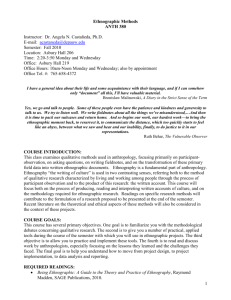


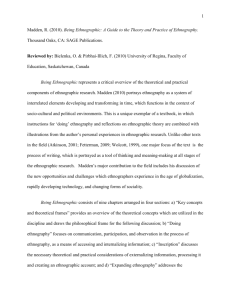

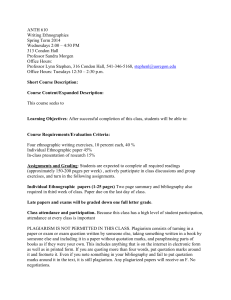

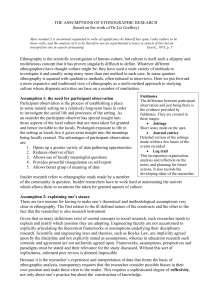
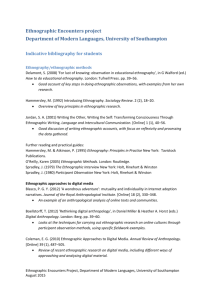


![Study_guide_to_Bourgois__Introduction[1]](http://s3.studylib.net/store/data/007553999_2-2eb0f63cb553cf43f41944cccde11900-300x300.png)